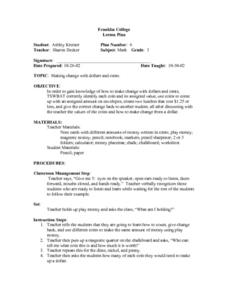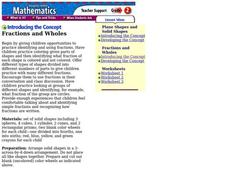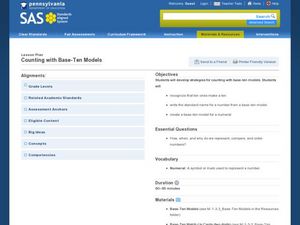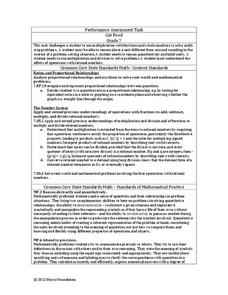Texas Commission on the Arts
The Quarter Fold
Little ones identify the US quarter and explore the concept of one-fourth or one-quarter. Using real coins or coin manipulatives, they divide a square piece of paper into quarters, discuss halves and quarters, and create a design that...
Curated OER
Labor, Choice, and Sales Tax
Students consider the idea of earning and spending money. In this money management lesson plan, students discuss the concept of saving and spending money through the reading of a story and by completing several activities that involve...
Curated OER
Shopping
Young scholars demonstrate how to count money through a simulated shopping experience. In this consumer math lesson, students read the book Just Shopping With Mom and count play money to illustrate how much the items in the book cost.
Curated OER
It's On Sale
First graders read the book The Great Pet Sale to learn about economics and advertisements. In this economics lesson plan, 1st graders read the book The Great Pet Sale and define related vocabulary words. Students compare prices to find...
Curated OER
What's on Sale?
Students explore sale items. In this money and percent math lesson, students work in groups to locate food ads in the newspaper. Students identify sales and calculate final prices using percentage discounts. Students complete a math...
Curated OER
Money Counting Worksheet
In this counting money learning exercise, students study the coins in each of 4 rows and count the amount of money they total. Students write the total amount.
Curated OER
Money Counting Worksheet
In this counting coins worksheet, learners look at the coins in each row, total their amount, and write their total in the blank.
Curated OER
Making Change with Dollars anc Cents
Third graders increase their knowledge of how to make change with dollars and cents by correctly identifying coins along with their values and then using coins to make an assigned amount which will be written on envelopes. They then...
ProCon
Gold Standard
If all the mined gold in the world was melted across a football field, it would rise 5.4 feet. That's just one interesting fact pupils learn when using the debate topics website to determine if the United States should return to a gold...
Visa
Earning Money
Where does money come from? Is it limitless and always available? Introduce your youngsters to the concept of earning through jobs and/or chores with a matching activity and provided worksheets.
Visa
Making Spending Decisions
By role playing real-world experiences, such as purchasing snacks and grocery/toy store shopping, your youngsters will begin to develop an understanding of how to make decisions and choose between alternatives. This is the first lesson...
Curated OER
Fractions and Wholes
Lower elementary learners recognize solid shapes distributed for making fractions. Each individual uses a wheel and determine which part of a fraction is missing. This is a great lesson for your visual learners!
Curated OER
Counting with Base - Ten Models
Help your kids develop strategies for counting. In this base-ten lesson, learners use matching cards, base 10 blocks, and dry erase markers and boards to examine the base 10 counting system.
Noyce Foundation
Cat Food
Determine the right mix of cans of cat food. The resource consists of an assessment task to determine the cost to feed two cats for a specific number of days and requires scholars to interpret remainders within a context. The resource...
Curated OER
I Have No Money, Would You Take Wampum
Students engage in a discussion about their experiences with goods, services, and money. For this bartering lesson, students read The Wampum Bird story and brainstorm their personal experiences with economics.
Curated OER
Time Value of Money
Young scholars evaluate the time value of money. In this economics instructional activity, students define inflation, interest, and the future value of money.
Curated OER
Building Tolerance for Poverty in Math
Students explore approximate and exact solutions. In this interdisciplinary lesson, 6th graders will be placed in 'family groups' to create a budget that is subject to random events as chosen from the 'things happen' box. This lesson...
Curated OER
Advisory in Action
Middle schoolers recognize that there are many ways to contribute to the community and the common good. In this importance of philanthropy lesson, students complete a worksheet to understand the community needs, how it is affected and...
Curated OER
Show Me the Money
Pupils investigate financial applications of mathematics in this mathematics instructional activity. They will investigate equations that represent a company’s income, expense, and profit functions and use those equations to identify...
Curated OER
The Secret Life of Money Part 1
Students explore money, how its value determined, and how mere slips of paper or coins, and in today's high-tech world electronic blips, represent the wealth of a nation.
Curated OER
Math TODAY Challenge - New Color of Money
Students read about the changes in the "new money" and then create a graph to represent various combinations of currency produced.
Curated OER
ADULT ESOL LESSON PLAN--Concepts of Time and Money.
Students identify/recognize types of currency in the United States. In addition, they view the symbols associated with money and practice reading prices (dollar/cent signs, decimal point, etc.).
Curated OER
Lesson 2: What Is Money?
Students describe the functions of money as a medium of exchange, a store or a measure of value. They determine a number of characteristics of money by completing an activity in which they assign common items the value to buy candy. They...
Curated OER
Money Madness
Second graders review coins and their values. In this coin recognition lesson, 2nd graders review the coin values as they read 'Smart' by Shel Silverstein. Students use class computer demonstrations to identify the coin's names, worth,...

























